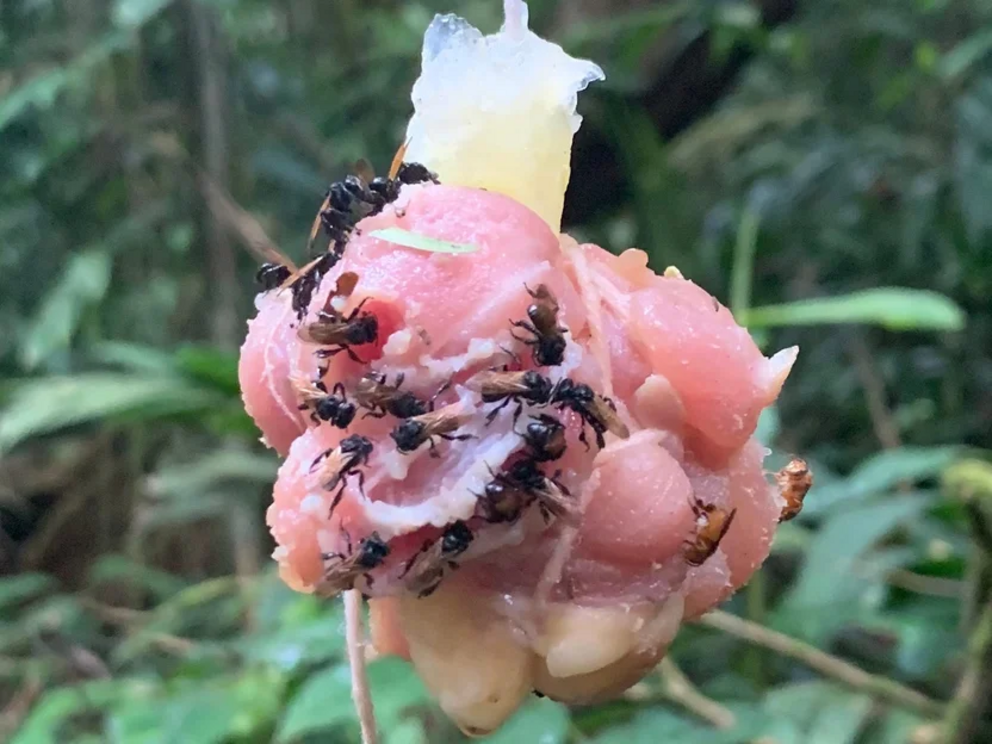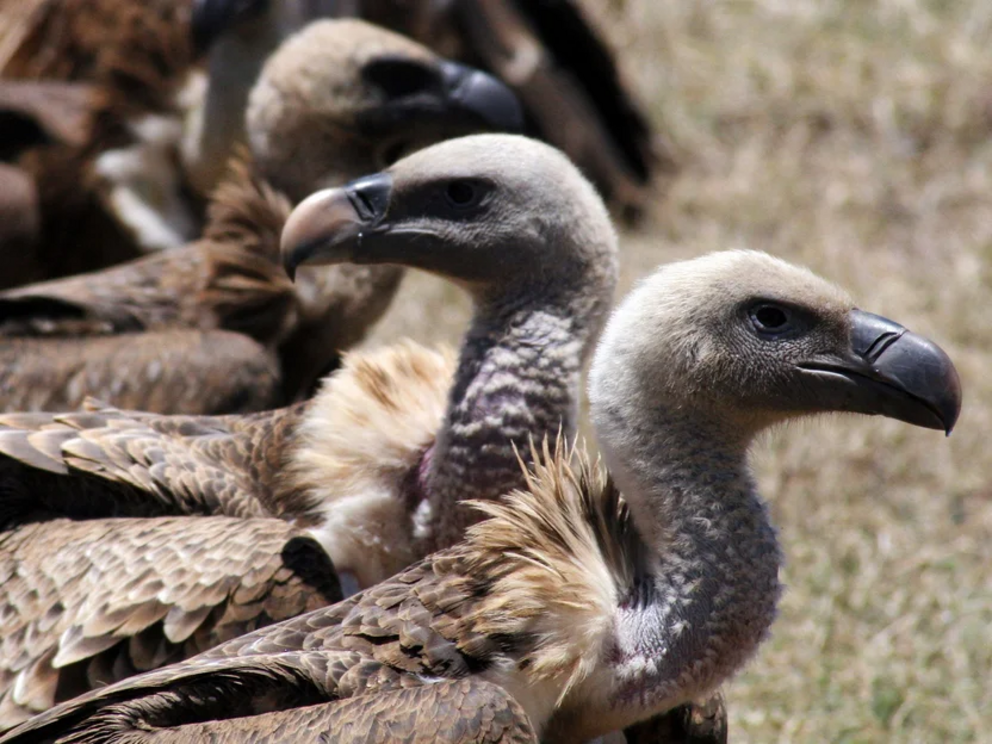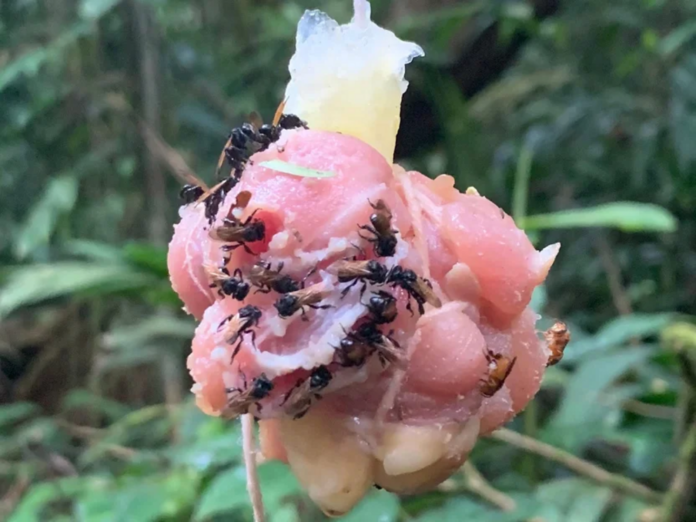
‘Vulture bees’ have quit pollen to feed their babies rotting meat — a mystery to scientists
Vulture bees in Costa Rica dining on raw chicken bait.
- “Vulture bees” have evolved to eat meat instead of relying on pollen like other bees.
- Scientists hung raw chicken in Costa Rica and watched vulture bees fill their leg pouches and stomachs with it.
- They found acid-producing microbes in the bees’ guts. Acid helps vultures and hyenas digest carrion.
A group of scientists biked around Costa Rica’s tropical forests, hanging chunks of raw chicken from the trees, in April 2019. They were trying to catch a rare insect: carrion-eating bees.
Slowly, over the next five days, large bees with long, dangling legs flocked to the bait. They crawled over the folds of raw chicken, using special teeth to slice off bits of meat. They gathered the flesh in little baskets on their hind legs, where other bees collect pollen, or swallowed the meat to store in their stomachs.
The bees were preparing to carry the chicken back to their hives, where they would enclose the meat chunks in pods, leave them there for two weeks, then feed them to their babies. Scientists aren’t sure what happens inside the pods during those two weeks, or how it affects the meat. The adults don’t need to eat protein. They survive on nectar.
The bees with leg baskets still collect pollen for their babies, too. But three species — out of more than 20,000 known bee species — feed their larvae an entirely carrion-based diet. They’re called “vulture bees.”
These bees are “super crazy on a bunch of different levels,” Jessica Maccaro, a doctoral student in entomology at University of California, Riverside (UCR), told Insider.
“The easiest way to think about bees is that they are vegetarian wasps. They evolved from wasps. Literally what differentiates them from wasps has been that they’re vegetarian,” Maccaro said. “So this is really surprising.”
Even wasps eat freshly killed meat, though. Rotting flesh can be a minefield of diseases, as microbes overtake the body and wage “microbial warfare,” producing powerful toxins as they compete for meat. Some of the bacteria itself, like salmonella, can be deadly.
“The environment on a dead body is really toxic,” Maccaro said. “That’s a major thing to overcome to be able to eat.”
That’s why Maccaro’s colleagues were baiting and capturing these mysterious bees — to study the microbes in their guts and learn how they’re able to eat carrion. Sure enough, the researchers discovered that vulture bees’ guts may be more like actual vultures or hyenas than their pollen-gathering relatives. They published their findings in mBio, the journal of the American Society of Microbiologists, on Tuesday.
“The weird things in the world are where a lot of interesting discoveries can be found,” Quinn McFrederick, an entomologist at UCR who led the research, said in a press release. “There’s a lot of insight there into the outcomes of natural selection.”
Gut bacteria may help vulture bees fight pathogens on rotting meat
 A committee of vultures gather for scavenging at the Ol Pejeta Conservancy in Kenya, October 3, 2020.
A committee of vultures gather for scavenging at the Ol Pejeta Conservancy in Kenya, October 3, 2020.
The chicken bait attracted an array of bees — one species that only collects meat, and several that collect both meat and pollen.
Separately, the researchers also captured some bees that only feed on pollen. That allowed them to compare the guts of carnivorous, omnivorous, and vegetarian bees.
The microbes in those guts were quite different. The vulture bees had lots of acid-producing bacteria like lactobacillus, probably creating a far more acidic gut than their pollen-eating cousins. That might help them fight toxins that form on rotting flesh.
“These bacteria are similar to ones found in actual vultures, as well as hyenas and other carrion-feeders, presumably to help protect them from pathogens that show up on carrion,” McFrederick said in the press release.
Vultures and hyenas produce much of their guts’ acid on their own, instead of relying on microbes. But the vulture bees’ dependence on bacteria is no suprise to Maccaro. Many kinds of bees use microbes to line their guts, protect them from parasites, and break down their food.
“We already can see that the microbiome is super important for bees for all these basic functions that we [humans] usually just kind of do ourselves,” Maccaro said. “So this is another case, where they’re using their microbiome to create this acidic environment rather than doing it themselves.”
Maccaro and her colleagues hope to collect bees in French Guiana next, where they can find two of the three bee species that only gather carrion. They want to study what happens in the pods where the vulture bees store meat before feeding it to their larvae.
“They store them and they seal them and they don’t touch them for two weeks, and then they can eat the meat,” Maccaro said. “We’re really curious about what’s happening.”

